- Home
- Margaret Atwood
Life Before Man Page 2
Life Before Man Read online
Page 2
A floor, a table, a chess set by the bed, a bed with what they called the trunk and limbs lying on it; Nate's other body, joined to him by that tenuous connection, that hole in space controlled by Elizabeth. Chris had put on a suit and tie, and a white shirt. Nate, thinking of that ceremony - the thick hands knotting the tie, straightening it in the mirror, God, his shoes were shined even - wanted to cry. He put his hands in his jacket pockets; his fingers closed on pennies, the house key.
"Any reason why he left your number on the table?" the second policeman said.
"No," Nate said. "We were friends of his, I guess."
"Both of you?" the first policeman said.
"Yes," said Nate.
Janet comes into the kitchen as he's sliding the casserole dish into the oven.
"What's for dinner?" she asks, adding "Dad," as if to remind him who he is.
Nate finds this question suddenly so mournful that for a moment he can't answer. It's a question from former times, the olden days. His eyes blur. He wants to drop the casserole on the floor and pick her up, hug her, but instead he closes the oven door gently.
"Macaroni and cheese," he says.
"Yum," she says, her voice remote, guarded, giving a careful imitation of pleasure. "With tomato sauce?"
"No," he says, "there wasn't any."
Janet runs her thumb across the kitchen table, squeaking it on the wood. She does this twice. "Is Mum resting?" she says.
"Yes," Nate says. Then, fatuously, "I took her a cup of tea." He puts one hand behind him, against the kitchen counter. They both know what to avoid.
"Well," Janet says in the voice of a small adult, "I'll be seeing you soon." She turns and goes back through the kitchen door.
Nate wants to do something, perform something, smash his hand through the kitchen window. But on the other side of the glass there's a screen. That would neutralize him. Whatever he does now will be absurd. What is smashing a window compared with blowing off your head? Cornered. If she'd planned it, she couldn't have done it better.
Friday, October 29, 1976
LESJE
Lesje is wandering in prehistory. Under a sun more orange than her own has ever been, in the middle of a swampy plain lush with thick-stalked plants and oversized ferns, a group of bony-plated stegosaurs is grazing. Around the edges of this group, protected by its presence but unrelated to it, are a few taller, more delicate camptosaurs. Cautious, nervous, they lift their small heads from time to time, raising themselves on their hind legs to sniff at the air. If there is danger they will give the alarm first. Closer to her, a flock of medium-sized pterosaurs glides from one giant tree-fern to another. Lesje crouches in the topmost frond-cluster of one of these trees, watching through binoculars, blissful, uninvolved. None of the dinosaurs takes the slightest interest in her. If they do happen to see or smell her, they will not notice her. She is something so totally alien to them that they will not be able to focus on her. When the aborigines sighted Captain Cook's ships, they ignored them because they knew such things could not exist. It's the next best thing to being invisible.
Lesje knows, when she thinks about it, that this is probably not everyone's idea of a restful fantasy. Nevertheless it's hers; especially since in it she allows herself to violate shamelessly whatever official version of paleontological reality she chooses. In general she is clear-eyed, objective, and doctrinaire enough during business hours, which is all the more reason, she feels, for her extravagance here in the Jurassic swamps. She mixes eras, adds colors: why not a metallic blue Stegosaurus with red and yellow dots instead of the dull greys and browns postulated by the experts? Of which she, in a minor way, is one. Across the flanks of the camptosaurs pastel flushes of color come and go, reddish pink, purple, light pink, reflecting emotions like the contracting and expanding chromatophores in the skins of octopuses. Only when the camptosaurs are dead do they turn grey.
After all it's not so fanciful; she's familiar with the coloration of some of the more exotic modern lizards, not to mention mammalian variations such as the rumps of mandrills. Those bizarre tendencies must have developed from somewhere.
Lesje knows she's regressing. She's been doing that a lot lately. This is a daydream left over from her childhood and early adolescence, shelved some time ago in favor of other speculations. Men replaced dinosaurs, true, in her head as in geological time; but thinking about men has become too unrewarding. Anyway, that part of her life is settled for the time being. Settled, as in: the fault settled. Right now men means William. William regards them both as settled. He sees no reason why anything should ever change. Neither does Lesje, when she considers it. Except that she can no longer daydream about William, even when she tries; nor can she remember what the daydreams were like when she did have them. A daydream about William is somehow a contradiction in terms. She doesn't attach much importance to this fact.
In prehistory there are no men, no other human beings, unless it's the occasional lone watcher like herself, tourist or refugee, hunched in his private fern with his binoculars, minding his own business.
The phone rings and Lesje jumps. Her eyes spring open, the hand holding her coffee mug flies into the air, fending off. She's one of those people unduly startled by sudden noises, she tells her friends. She sees herself as a timorous person, a herbivore. She jumps when people come up behind her and when the subway guard blows his whistle, even when she knows the people are there or the whistle will be blown. Some of her friends find this endearing but she's aware that others find it merely irritating.
But she doesn't like being irritating, so she tries to control herself even when nobody else is with her. She puts her coffee mug down on the table - she'll wipe the spill up later - and goes to answer the phone. She doesn't know who she expects it to be, who she wants it to be. She realizes that these are two different things.
By the time she picks up the phone the line is already open. The hum on the phone is the city's hum, reverberating outside the plate glass, amplified by the cement cliffs that face her and in which she herself lives. A cliff dweller, cliff hanger. The fourteenth level.
Lesje holds the phone for a minute, listening to the hum as if to a voice. Then she puts it down. Not William in any case. He's never phoned her without having something to say, some pragmatic message. I'm coming over. Meet me at. I can't make it at. Let's go to. And later, when they'd moved in together, I'll be back at. And lately, I won't be back until. Lesje considers it a sign of the maturity of the relationship that his absences do not disturb her. She knows he's working on an important project. Sewage disposal. She respects his work. They've always promised to give each other a lot of room.
This is the third time. Twice last week and now. This morning she mentioned it, just as a piece of conversation, to the girls at work, women at work, flashing her teeth in a quick smile to show she wasn't worried about it, then covering her mouth immediately with her hand. She thinks of her teeth as too large for her face: they make her look skeletal, hungry.
Elizabeth Schoenhof was there, in the cafeteria where they always went at ten-thirty if they weren't working too hard. She's from Special Projects. Lesje sees a fair amount of her because fossils are one of the more popular museum features and Elizabeth likes to work them in. This time she'd come over to their table to say she needed a little of Lesje's material for a display-case series. She wanted to juxtapose some of the small items from Canadiana with natural objects from the same geographical regions. Artifact and Environment, she was calling it. She could use some stuffed animals to go with the pioneer axes and traps, and a few fossil bones for atmosphere.
"This is an old country," she said. "We want people to see that."
Lesje is against this eclectic sort of promotion, though she sees the need for it. The general public. Still, it trivializes, and Lesje registered an inner objection when Elizabeth asked, in that competent maternal manner of hers, whether Lesje couldn't find her some really interesting fossils. Weren't all fossils interesting? L
esje said politely that she would see what she could do.
Elizabeth, adept at cataloguing the reactions of others, for which Lesje holds her in some awe - she herself, she feels, cannot do this - explained carefully that she meant visually interesting. She really would appreciate it, she said.
Lesje, always responsive to appreciation, warmed. If Elizabeth wanted some outsize phalanges and a cranium or two she was welcome to them. Besides, Elizabeth looked terrible, white as a sheet, though everyone said she was coping marvelously. Lesje can't imagine herself in that situation, so she can't predict how she herself would cope. Of course everyone knew, it had been in the papers, and Elizabeth had not made much of an effort to hide the facts while it was going on.
They all scrupulously avoided mentioning Chris or anything relating to him in front of Elizabeth. Lesje caught herself blinking when Elizabeth said she wanted to use a flintlock in the display. She herself wouldn't have chosen guns. But perhaps these blind spots were necessary, were part of coping marvelously. Without them, how could you do it?
To change the subject she said brightly, "Guess what? I've been getting anonymous phone calls."
"Obscene?" Marianne asked.
Lesje said no. "Whoever it is just lets the phone ring and then when I answer he hangs up."
"Wrong number, probably," Marianne said, her interest flagging.
"How do you know it's a he?" Trish asked.
Elizabeth said, "Excuse me." She stood up, paused for a moment, then turned and walked steadily as a somnambulist across the floor towards the door.
"It's awful," Trish said. "She must feel terrible."
"Did I say something wrong?" Lesje asked. She hadn't meant to.
"Didn't you know?" Marianne said. "He used to phone her like that. At least once a night, for the last month. After he quit here. She told Philip Burroughs, oh, quite a while before it happened. You'd think she would've known it was building up to something."
Lesje blushed and brought her hand up to the side of her face. There were always things she didn't know. Now Elizabeth would think she'd done that on purpose and would dislike her. She couldn't figure out how that particular piece of gossip had slipped by her. They'd probably talked about it right here at this table and she hadn't been paying attention.
Lesje goes back to the living room, sits down in the chair beside her spilled coffee, and lights a cigarette. When she smokes she doesn't inhale. Instead she holds her right hand in front of her mouth with the cigarette between the first two fingers, thumb along the jawbone. That way she can talk and laugh in safety, blinking through the smoke that rises into her eyes. Her eyes are her good point. She can see why they wore veils, half-veils, in those Middle Eastern countries. It had nothing to do with modesty. Sometimes when she's alone she holds one of her flowered pillowcases across the lower half of her face, over the bridge of her nose, that nose just a little too long, a little too curved for this country. Her eyes, dark, almost black, look back at her in the bathroom mirror, enigmatic above the blue and purple flowers.
Saturday, October 30, 1976
ELIZABETH
Elizabeth sits on the grey sofa in the underwater light of her living room, hands folded in her lap sedately, as if waiting for a plane. The light here is never direct, since the room faces north; she finds this peaceful. The sofa is not really grey, not only grey; it has a soft mauve underfigure, a design like veining; a batik. She chose it because it didn't hurt her eyes.
On the mushroom-colored rug, near her left foot, there's a scrap of orange crepe paper, a spillover from something the children are doing in their room. A scrap of flame, jarring. But she lets it lie. Ordinarily she would bend, pick it up, crumple it. She doesn't like anyone disturbing this room, the children or Nate with his trails of sawdust and spots of linseed oil. They can make as much mess as they like in their own rooms, where she doesn't have to cope with it. She once thought of having plants in this room as well as in her bedroom but decided against it. She doesn't want anything else she will have to take care of.
She closes her eyes. Chris is in the room with her, a weight, heavy, breathless, like the air before a thunderstorm. Sultry. Sultan. Sullen. But it isn't because he's dead, he was always like that. Backing her against the door, his arms clamping around her, shoulders massive when she tried to push him off, face heavily down on hers, force of gravity. Leaning on her. I won't let you go yet. She hates it when anyone has power over her. Nate doesn't have that kind of power, he never had. She married him easily, like trying on a shoe.
She's in the room on Parliament Street, drinking wine, the slopped glasses making mulberry rings on the linoleum of his rented table, she can see the design on the oilcloth, tasteless wreaths of flowers, lime-green on yellow, as if it's been burnt into her eyes. They always whisper in that room, though there's no need to. Nate is several miles away from them and he knows where she is anyway, she leaves the number in case of an emergency. Their whispers and his eyes with their flat hot surfaces, a glint like nailheads. Copperheads. Pennies on the eyes. Gripping her hand across the table as though, if he lets go, she will slide down past the edge of the table, the edge of some cliff or quicksand, and be lost forever. Or he will.
Listening, her eyes on the wrinkled surface of the table, the squat candle he bought from some street peddler, the deliberately tacky plastic flowers and the owl he'd stolen from work, not even mounted, eyeless, his macabre joke. The wreaths turning slowly on the surface of the table as on an oily sea, floating out; somewhere they did that as a blessing. Then rising, the violence in his hands held back, everything held back, falling, salt body stretching along her, dense as earth, on that bed she would never stay to sleep in, the sheets always a little damp, smoky, holding back until nothing could be held back. She has never seen that room by daylight. She refuses to imagine what it looks like now. The mattress bare. Someone would have come, cleaned the floor.
She opens her eyes. She must focus on something simple and clear. There are three bowls on the sideboard, pinkish mauve, porcelain, Kayo's, he's one of the best. She's confident in her taste, she knows enough to have earned that confidence. The sideboard is pine, she bought it before pine became fashionable, had it stripped down before having things stripped down became fashionable. She couldn't afford it now. It's a good piece, the bowls are good pieces. She wouldn't have anything in this room that was not a good piece. She lets her eyes slide over the bowls, over their subtle colors, their slightly asymmetrical curves, wonderful to have that sense, where to be off balance. There's nothing in them. What could you possibly put into such bowls? Not flowers or letters. They were meant to hold something else, they were meant for offerings. Right now they hold their own space, their own beautifully shaped absence.
There was your room and there was everything else outside, and that barrier between the two. You carried that room around with you like a smell, it was a smell like formaldehyde and the insides of old cupboards, mousy, secretive, like musk, dusky and rich. Whenever I was with you I was in that room, even when we were outside, even when we were here. I'm in it now, only now you've locked the door, brown door with scaling paint, varnish, the brass-colored lock and the chain, two bullet holes through the wood where, you told me, they'd been shooting in the hallway the week before. It wasn't a safe neighborhood. I always took taxis, asked the driver to wait until I'd pressed the buzzer and was safe in the foyer with its gap-toothed mosaic floor. Safe, always a joke. The door's locked, not for the first time; you don't want me ever to get out. You always knew I wanted to get out. But at the same time we were conspirators, we knew things about each other no one else will ever know. In some ways I trust you more than I've ever trusted anyone.
I have to go now, she says. He's twisting a length of her hair, twisting and untwisting it. He runs his index finger between her lips, left-handed, across her teeth; she can taste wine and her own sweat, taste of herself, blood from a bitten lip, she no longer knows whose.
Why, he says.
&nbs
p; I just have to. She doesn't want to say the children because it will make him angry. But she doesn't want them to wake up and not know where she is.
He doesn't answer; he keeps twisting and untwisting her hair, his own hair brushing her neck like feathers, his fingers sliding now over her chin and throat, as if he's deaf, as if he can no longer hear her.
Saturday, October 30, 1976
LESJE
Lesje is walking beside William, hand in cool hand. There are no dinosaurs here; only similar walkers, on the prowl like themselves, an apparently aimless prowl through the lighted grid of the central city. In passing, Lesje glances into the windows of dress shops, department stores, appraising the cadaverous mannequins who stand with their pelvises thrust forward, hands angular on hips, legs apart, one knee bent. If these bodies were in motion they would be gyrating, jerking, a stripper's orgasmic finale. Since they are frozen plaster and wire, however, they are in good taste.
Lesje has been spending quite a lot of time lately in these same shops, on her way home from work. She flips through the racks, looking for something that might become her, something she might become. She almost never buys anything. The dresses she tries on are long, flowing, embroidered, very different from the denims and subdued classics she habitually wears. Some with full skirts; the peasant look. How her grandmother would laugh. That little sound, like a door creaking, that used to come from behind her tiny walnut-colored hands.
She's thought about getting her ears pierced. Sometimes, after checking through the dresses, she goes to the perfume counter and tries the testers on her wrists. William says he isn't interested in clothes. His one stipulation is that she must not cut her hair. This is all right, since she doesn't want to cut it. She's not betraying anything.

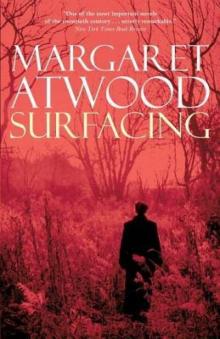 Surfacing
Surfacing Hag-Seed
Hag-Seed Oryx and Crake
Oryx and Crake The Heart Goes Last
The Heart Goes Last The Handmaid's Tale
The Handmaid's Tale Lady Oracle
Lady Oracle Good Bones and Simple Murders
Good Bones and Simple Murders The Robber Bride
The Robber Bride Life Before Man
Life Before Man Alias Grace
Alias Grace The Blind Assassin
The Blind Assassin Cat's Eye
Cat's Eye The Testaments
The Testaments The Penelopiad
The Penelopiad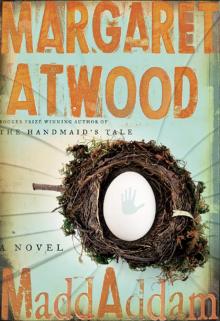 MaddAddam
MaddAddam Dancing Girls & Other Stories
Dancing Girls & Other Stories On Writers and Writing
On Writers and Writing Selected Poems II (1976-1986)
Selected Poems II (1976-1986) Wilderness Tips
Wilderness Tips Dearly
Dearly The Tent
The Tent Bluebeard's Egg
Bluebeard's Egg The Edible Woman
The Edible Woman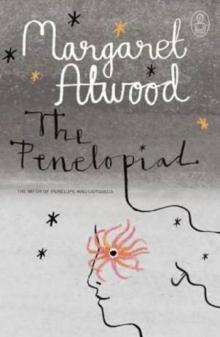 The Penelopiad: The Myth of Penelope and Odysseus
The Penelopiad: The Myth of Penelope and Odysseus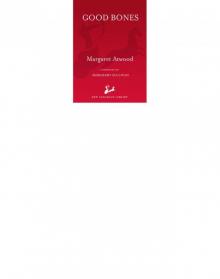 Good Bones
Good Bones I Dream of Zenia with the Bright Red Teeth
I Dream of Zenia with the Bright Red Teeth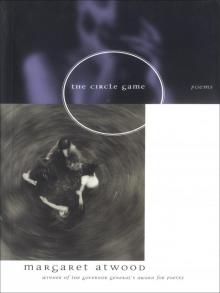 Circle Game
Circle Game Choke Collar: Positron, Episode Two
Choke Collar: Positron, Episode Two Stone Mattress: Nine Tales
Stone Mattress: Nine Tales The MaddAddam Trilogy
The MaddAddam Trilogy Stone Mattress
Stone Mattress Power Politics
Power Politics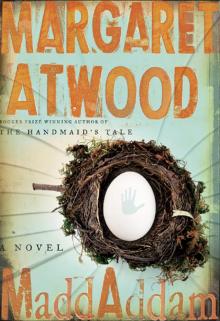 MaddAddam 03 - MaddAddam
MaddAddam 03 - MaddAddam I’m Starved for You (Kindle Single)
I’m Starved for You (Kindle Single) Murder in the Dark
Murder in the Dark In Other Worlds
In Other Worlds Dancing Girls
Dancing Girls Moral Disorder
Moral Disorder